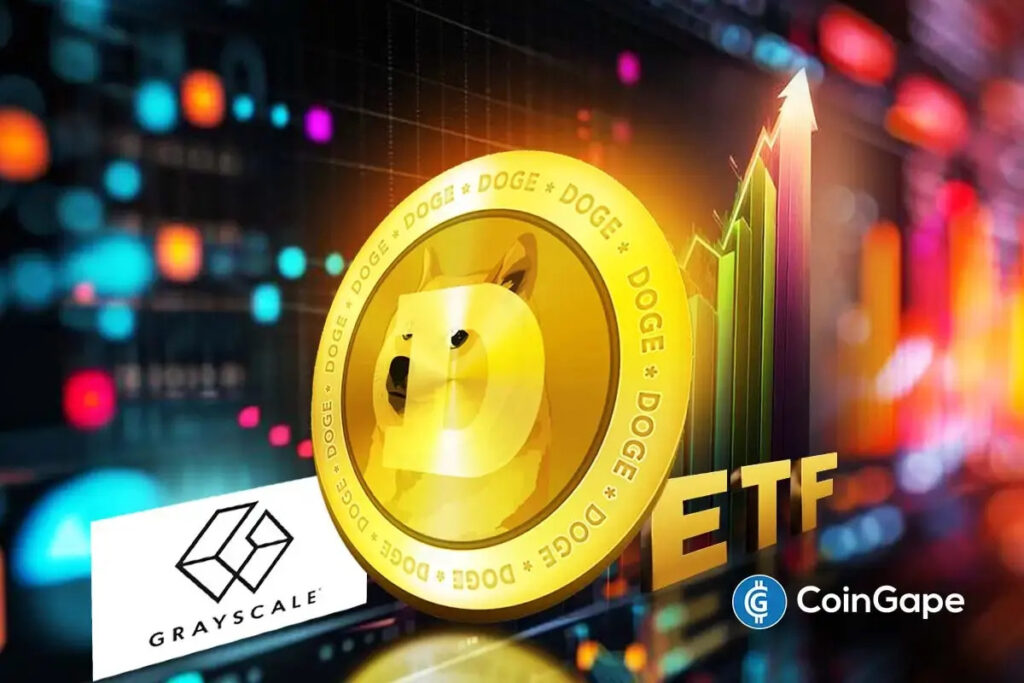Grayscale Moves Toward Dogecoin ETF Approval: A Regulatory Perspective
Grayscale Investments is on the cusp of launching its Dogecoin ETF, poised to become the second DOGE-linked product in the United States. This initiative comes amid evolving regulatory considerations in the cryptocurrency space, particularly as firms navigate various approval frameworks. With Grayscale advancing through a formal regulatory process distinctly different from its competitors, the market anticipates significant developments in the landscape surrounding crypto fund approvals.
Regulatory Landscape and Upcoming Launch
Analyst Eric Balchunas from Bloomberg has signaled that Grayscale’s Dogecoin ETF could make its market debut on November 24. His analysis is rooted in the firm’s ongoing transition of its trusts into ETFs, similar to previous moves made with other digital assets. Although there is no explicit schedule from the Securities and Exchange Commission (SEC) yet, the anticipation surrounding the launch underscores the growing interest in crypto ETFs and their potential influence on market dynamics.
The catalyst for Grayscale’s progress was its filing of an S-1 registration statement for the Dogecoin Trust on August 15, 2025. This statement is a key step in listing the product as an exchange-traded fund, proposed under the ticker GDOG. Following this, Grayscale submitted a 19b-4 application with NYSE Arca on January 31, seeking permission to publicly trade GDOG shares. Both filings are part of the Securities Act of 1933, and the ETF will only launch following direct approval from the SEC.
Contrasting Approaches: Grayscale vs. REX-Osprey
In contrast, the first Dogecoin ETF launched by REX-Osprey took a divergent regulatory route. The REX-Osprey DOGE ETF, trading under the ticker DOJE, kickstarted on September 18, 2025. Utilizing a structure governed by the Investment Company Act of 1940, this approach enables automatic effectiveness within 75 days, provided regulators raise no objections. This framework bypasses direct SEC approval and accelerates the time-to-market for new funds.
The streamlined process employed by REX-Osprey underlines a notable contrast with Grayscale’s regulatory path. While Grayscale’s method requires extensive approval timelines, REX-Osprey’s approach allows for quicker market access, reflecting different strategies among ETF issuers as they navigate the current regulatory environment in the cryptocurrency domain.
Understanding DOJE’s Unique Approach
What sets the REX-Osprey DOGE ETF apart is its investment strategy. Rather than holding Dogecoin directly in its portfolio, DOJE provides exposure to DOGE using futures and similar contracts, representing about 80% of its assets. The remaining 20% is allocated to U.S. Treasury securities. This innovative structure reflects a unique method for investors to gain indirect exposure to Dogecoin without complying with the traditional custody rules associated with holding cryptocurrencies directly.
The Cayman Islands subsidiary manages the derivatives positions, ensuring that the fund adheres to the standards set forth in the Investment Company Act of 1940. This approach not only circumvents the complexities involved with direct custody of digital assets but also aligns with the regulatory requirements necessary to expedite market entry.
The Current Market Landscape for DOGE and Crypto ETFs
As of now, Dogecoin holds a substantial market capitalization of approximately $23.09 billion, positioning it as the 10th largest cryptocurrency by market value. This liquidity and active derivatives market are critical factors for ETF issuers, especially as regulators impose stringent conditions on spot-based crypto products. The competitive landscape is further complemented by other entities striving to introduce crypto ETF products, enhancing overall market diversity.
In addition to Grayscale’s efforts, other notable initiatives in the crypto ETF realm include Canary Capital’s launch of the first spot XRP ETF, which has broadened institutional access to XRP exposure. Moreover, VanEck has introduced a Solana ETF in the United States, accompanied by a zero-fee structure to attract cost-conscious investors, showcasing the growing interest in single-asset crypto funds.
Future Prospects for Grayscale’s Dogecoin ETF
The anticipated launch of Grayscale’s GDOG would significantly broaden the range of options available to investors looking for diversified exposure to digital assets. With the introduction of both DOJE and GDOG, market participants will have multiple avenues to engage with Dogecoin, depending on their investment preferences and risk profiles. This bifurcation in investment options enhances the overall appeal of cryptocurrencies, allowing for more tailored investment strategies.
As Grayscale moves closer to final approval for its Dogecoin ETF, the cryptocurrency ecosystem continues to evolve. The interplay of regulatory considerations, innovative fund structures, and market demand will shape both Dogecoin’s future and the broader landscape for cryptocurrency investment products in the United States and beyond.
In conclusion, Grayscale’s imminent entry into the Dogecoin ETF market reflects not only growing institutional interest in cryptocurrencies but also highlights the need for adaptable regulatory frameworks. As investors await further developments, the focus of the industry will remain sharply on how firms navigate the intricate landscape of crypto fund approvals.


